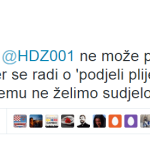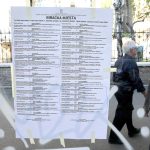House of Cards, Games of Thrones or Fawlty Towers?
It might seem like an eternity, but it’s been only 40 days since the new Croatian government took power. And while there have been occasional successes, not even the most ardent supporters would claim that the government is off to a good start. What follows is a review of some of the most important events in Croatian politics since 22 December 2015, the day when everything changed, as reported by TCN.
The day started with MOST and SDP continuing with their coalition negotiations and HDZ preparing to spend the next four years in opposition. President Kolinda Grabar-Kitarović held consultations with representatives of various parties about who will be named Prime Minister-designate. In the morning, SDP President Zoran Milanović was confident that his party and MOST would be forming the new government. However, when MOST leader Božo Petrov left the President’s office, it was clear something had changed. Just an hour later, Petrov announced that MOST was breaking up coalition negotiations with SDP. It is still not clear what happened and who said or showed what to whom, but there was no going back – the coalition between MOST and SDP was not going to happen.
MOST immediately started negotiations with HDZ about a possible coalition. By that evening, they brought to the President signatures showing that they had a majority in Parliament, but they still missed the name of the future Prime Minister. MOST was adamant that it had to be a non-party person and that they would not accept HDZ president Tomislav Karamarko. The President gave them 24 hours to find the next Croatian Prime Minister. And they did precisely that. Tihomir Orešković, a Croatian-Canadian businessman working as the financial director of pharmaceutical company Teva, was chosen as the Prime Minister-designate. He reportedly had three hours to think it over and accept the position. And so, on 23 December, he came to the President’s Office accompanied by Karamarko and Petrov and received the official appointment as Prime Minister-designate. At the ceremony which marked his appointment, Orešković surprised everyone by not speaking Croatian very well. Even though he was born in Croatia, all the years spent in Canada and elsewhere had left their mark.
We did not have to wait long for the first controversies to start. While Orešković was trying to negotiate with HDZ and MOST about who will enter the government, some of the ministerial candidates started promoting themselves hoping to be appointed. But, not all of them chose the best approach. Ante Ćorušić, the most likely candidate for Health Minister, gave an interview in which he announced possible restrictions to abortion rights and assisted reproductive techniques. His statements, while not surprising given his political orientation, did not go well with the public and caused an uproar among women rights groups. That was enough for the candidate minister to lose any chance of actually becoming a minister.
The beginning of 2016 brought us the first minor scandal. Newly-elected Speaker of the Croatian Parliament Željko Reiner was photographed using his police escort to avoid waiting in lines at toll booths on a highway while going for a one-week skiing trip. While it is understandable that officially the second most important person in the country has a police escort, many wondered whether it was really appropriate for him to go to a skiing holiday literally just a few days after landing such an important job, particularly since the government had not yet been formed. The incident forced the Speaker to explain himself in interviews given by a phone from the ski slopes, but no major damage was done.
While waiting for the government to be formed, various proposals about everything started appearing. One of the most interesting one came from Tomislav Karamarko, a self-proclaimed anticommunist. He proposed that the new government, in which he was to be the First Deputy Prime Minister, should relocate from its current seat, the Banski Dvori palace, to Kockica, the former Communist Party headquarters. Two months later, the government has still not relocated.
Finally, on 22 January, a few minutes before midnight, the Parliament confirmed the new government. Prime Minister Orešković went to the other side of St. Mark’s Square and took power from former PM Zoran Milanović. The new era had begun.
The honeymoon did not last long. As one of the more interesting members of the new government, Veterans Affairs Minister Mijo Crnoja had many novel policy ideas which had nothing to do with veterans, but which still managed to find their way into his statements. One of his proposals was the establishment of the Register of Traitors of Croatian National Interests. Although his idea did not find sufficient support to be implemented for real, some of the self-proclaimed traitors have decided to help and out themselves as traitors on a dedicated website.
However, the real problems for Minister Crnoja were only beginning. Just a few days into his ministerial term, the media reported that he had registered as his official place of residence a small shed in Samobor, while actually living in a normal apartment in Zagreb, which enabled him to pay lower local taxes. The news was followed by many other revelations, about him spending time in prison for hitting a bus driver in the head and about maltreatment of a mother of a child with special needs. After two long days and nights of consultations between HDZ, MOST and Orešković, it was time for Crnoja to go. Resigning just six days after becoming a minister, he entered history as the minister with the shortest term in office in Croatian political history. More than a month later, the Veterans Affairs Minister post remains vacant.
While Crnoja was the most controversial among ministers, he was hardly the only one who attracted media interest for all the wrong reasons. Culture Minister Zlatko Hasanbegović has a history of giving what some have called pro-fascist statements. Protests against his appointment started even before the official appointment and have continued since, including among representatives of the Croatian cultural sector and international organizations like Simon Wiesenthal Centre. The controversies continued, especially after a magazine published a photo of a young Hasanbegović wearing a cap which looked awfully similar to caps used by members of the Ustashe movement during the World War II. Still, after Crnoja’s resignation, the government could hardly have allowed another minister go in such a short period, so he remained as minister after giving a statement in which he tried to explain his position.
While Crnoja and Hasanbegović entered the government as part of the HDZ quota, the third controversial minister was a member of MOST. Some media reported that Economy Minister Tomislav Panenić was fired from an earlier job due to theft of Styrofoam. The Minister denied the accusations saying that he donated a small amount of Styrofoam to a needy family, and since no new damaging information surfaced, it would seem he is safe for now.
Ministerial controversies continued mid-February when Science Minister Predrag Šustar raised some eyebrows saying that the issue of evolution theory has not been settled and mentioned the possibility that God was the designer of the world. He later backtracked a little and explained himself, so the media storm did not last long.
To be fair, it is not just the ministers who are controversial. Just a few days ago, the selection of Deputy Tourism Minister also raised eyebrows. Robert Pauletić is a well-known Croatian globetrotter and the youngest quiz-master in Croatian history, but is unfortunately prone to writing articles and posts about foreign tourists which hardly make him an ideal Deputy Tourism Minister. He explained it all away as being examples of his unique kind of humour and satire.
In addition to scandals with ministers, there were some serious policy disagreement in the new government. On 5 February, President Kolinda Grabar Kitarović signed the dismissal of Security Intelligence Agency director Dragan Lozančić for allegedly breaking the law, although no additional details about his alleged infractions have been released. However, for the decision to become official, it is necessary to be countersigned by the Prime Minister. However, the President decided to dismiss Lozančić before coming to a mutual decision with the PM. Even worse, the official announcement about her decision was released at the very moment when the Prime Minister was giving statement to reporters that he and the President would make a joint decision “next week”. It was quite embarrassing for the Prime Minister to be publicly humiliated in such a way, so he decided to postpone his decision seemingly indefinitely. Twenty five days later, Lozančić has still not been officially dismissed. And that is causing a rift within the government, since Karamarko and HDZ support the President’s decision, while MOST does not appear to know what it thinks. The denouement remains to be seen.
Still, there were some good news as well. Interior Minister Vlaho Orepić appears to be one of the more popular and capable new ministers, and he got a lot of good publicity when in February he made a decision to cut costs in his Ministry by taking away official cars from numerous deputies, assistants and police chiefs who used to have an official car available 24 hours a day. It’s not much, but it is something.
Tourism Minister Anton Kliman was also in the spotlight due to some good news. He announced several rounds of major investments in tourism. Although these are private investments, at least the government did not put unnecessary obstacles for investors, which is a welcome change for Croatia. He also managed to convince Construction and Urban Planning Minister Lovro Kuščević to abolish the requirement for tourist rental owners to acquire rather expensive energy certificates.
Investments and reforms – these are two of the most often mentioned words in Croatian politics. While reforms are nowhere to be seen yet, there are some reports that investments might be coming. Government proudly announced that the Prime Minister met with representatives on a major ICT company. Later it was leaked that the company in question was IBM, which could open a technical support centre somewhere in Croatia. We do need all the support we can get.
The latest ministerial controversy involves the still vacant post of Veterans Affairs Minister. A week ago, Tomislav Karamarko announced that HDZ secretary general Milijan Brkić will become the new minister. However, it seems that he made the announcement without consulting either his coalition partners or the Prime Minister, and possibly even Brkić himself. Unfortunately for Karamarko (and Brkić), immediately after Karamarko’s statement, the Police Academy announced that it will restart the proceedings to annul Brkić’s university diploma due to plagiarism. His diploma was already annulled once, but a court repealed the decision due to procedural reasons, without denying that plagiarism occurred. Since MOST is trying to present itself as an honest new political force, it will not be easy for them to accept Brkić’s nomination. However, Brkić is the second most powerful person in HDZ, so HDZ will not give up easily. While the reports about ultimatums have been denied, there are no doubt strong tensions within the ruling coalition, which were confirmed by the duelling press conferences by Božo Petrov and Tomislav Karamarko just this afternoon.
Teething problems are nothing unexpected, but it is quite clear that with the current government there is more than that. We will try to analyze it further in our next review when the government passes its 100th day mark – provided it lasts that long.









